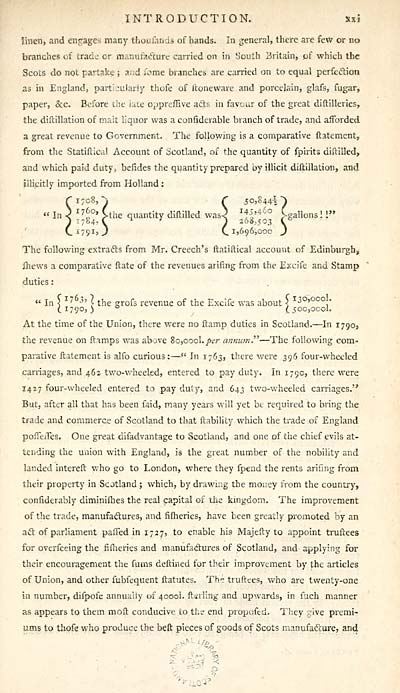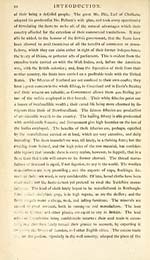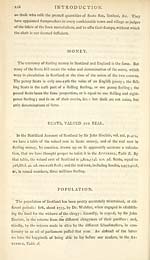Gazetteer of Scotland
(29) Page xxi
Download files
Complete book:
Individual page:
Thumbnail gallery: Grid view | List view

INTRODUCTION. xxi
linen, and engages many thoufands of hands. In general, there are few or no
branches of trade or manufacture carried on in South Britain, pf which the
Scots do not partake ; ?..d fame branches are carried on to equal perfection
as in England, particularly thofe of itoneware and porcelain, glafs, fugar,
paper, &c. Before the late oppreffive acts in favour of the great diftilleries,
the diftillation of malt liquor was a considerable branch of trade, and afforded
a great revenue to Government. The following is a comparative ftatement,
from the Statiftical Account of Scotland, of the quantity of fpirits diftilled,
and which paid duty, befides the quantity prepared oy illicit diftillation, and
illicitly imported from Holland :
f 1708, ") C 50,844!")
" In -< I7 ^ ' >the quantity diftilled was-< J ^' 46 ° ^gallons !
1 1784.1 ^ ; } 208,503 i b
(_i79i,_) C_ 1,696,00c J
,oool.
,ocoh
The following extracts from Mr. Creech's ftatiftical account of Edinburgh
Ihews a comparative ftate of the revenues arifing from the Excife and Stamp
duties :
" In < ' -^' f the grofs revenue of the Excife was about < ^° ,c
(.1790,) to (500,0
At the time of the Union, there were no ftamp duties in Scotland. — In 1790,
the revenue on (lamps was above %o,ooo\. per annum ." — The following com-
parative ftatement is alfo curious: — " In 1763, there were 396 four-wheeled
carriages, and 462 two-wheeled, entered to pay duty. In 1790, there were
1427 four-wheeled entered to pay duty, and 643 two-wheeled carriages.''
But, after all that has been faid, many years will yet be required to bring the
trade and commerce of Scotland to that ft ability which the trade of England
poffedes. One great difadvantage to Scotland, and one of the chief evils at-
tending the union with England, is the great number of the nobility and
landed intereft who go to London, where they fpend the rents arifing from
their property in Scotland ; which, by drawing the money from the country,
confiderably diminifhes the real capital of the kingdom. The improvement
of the trade, manufactures, and fifheries, have been greatly promoted by an
act of parliament paffed in 1727, to enable his Majefty to appoint truftees
for overfeeing the fifheries and manufactures of Scotland, and applying for
their encouragement the fums deftined for their improvement by the articles
of Union, and other fubfequent ftatutes. The truftees, who are twenty -one
in number, difpofe annually of 4000I. fterling and upwards, in fuch manner
as appears to them moil conducive to the end propeftd. They give premi-
ums to thofe who produce the belt pieces of goods of Scots manufacture, and
2. v ,Uvfj <
linen, and engages many thoufands of hands. In general, there are few or no
branches of trade or manufacture carried on in South Britain, pf which the
Scots do not partake ; ?..d fame branches are carried on to equal perfection
as in England, particularly thofe of itoneware and porcelain, glafs, fugar,
paper, &c. Before the late oppreffive acts in favour of the great diftilleries,
the diftillation of malt liquor was a considerable branch of trade, and afforded
a great revenue to Government. The following is a comparative ftatement,
from the Statiftical Account of Scotland, of the quantity of fpirits diftilled,
and which paid duty, befides the quantity prepared oy illicit diftillation, and
illicitly imported from Holland :
f 1708, ") C 50,844!")
" In -< I7 ^ ' >the quantity diftilled was-< J ^' 46 ° ^gallons !
1 1784.1 ^ ; } 208,503 i b
(_i79i,_) C_ 1,696,00c J
,oool.
,ocoh
The following extracts from Mr. Creech's ftatiftical account of Edinburgh
Ihews a comparative ftate of the revenues arifing from the Excife and Stamp
duties :
" In < ' -^' f the grofs revenue of the Excife was about < ^° ,c
(.1790,) to (500,0
At the time of the Union, there were no ftamp duties in Scotland. — In 1790,
the revenue on (lamps was above %o,ooo\. per annum ." — The following com-
parative ftatement is alfo curious: — " In 1763, there were 396 four-wheeled
carriages, and 462 two-wheeled, entered to pay duty. In 1790, there were
1427 four-wheeled entered to pay duty, and 643 two-wheeled carriages.''
But, after all that has been faid, many years will yet be required to bring the
trade and commerce of Scotland to that ft ability which the trade of England
poffedes. One great difadvantage to Scotland, and one of the chief evils at-
tending the union with England, is the great number of the nobility and
landed intereft who go to London, where they fpend the rents arifing from
their property in Scotland ; which, by drawing the money from the country,
confiderably diminifhes the real capital of the kingdom. The improvement
of the trade, manufactures, and fifheries, have been greatly promoted by an
act of parliament paffed in 1727, to enable his Majefty to appoint truftees
for overfeeing the fifheries and manufactures of Scotland, and applying for
their encouragement the fums deftined for their improvement by the articles
of Union, and other fubfequent ftatutes. The truftees, who are twenty -one
in number, difpofe annually of 4000I. fterling and upwards, in fuch manner
as appears to them moil conducive to the end propeftd. They give premi-
ums to thofe who produce the belt pieces of goods of Scots manufacture, and
2. v ,Uvfj <
Set display mode to: Large image | Transcription
Images and transcriptions on this page, including medium image downloads, may be used under the Creative Commons Attribution 4.0 International Licence unless otherwise stated. ![]()
| Gazetteers of Scotland, 1803-1901 > Gazetteer of Scotland > (29) Page xxi |
|---|
| Permanent URL | https://digital.nls.uk/97343776 |
|---|

